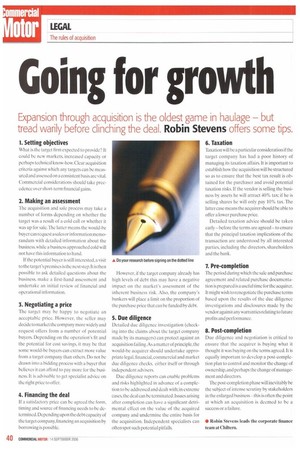Going for growth
Page 40

If you've noticed an error in this article please click here to report it so we can fix it.
Expansion through acquisition is the oldest game in haulage — but tread warily before clinching the deal. Robin Stevens offers some tips.
1. Setting objectives
What is the target firm expected to provide? It could be new markets, increased capacity or perhaps technical know-how. Clear acquisition criteria against which any targets can be measured and assessed on a consistent basis are vital. Commercial considerations should take precedence over short-term financial gains.
2. Making an assessment
The acquisition and sale process may take a number of forms depending on whether the target was a result of a cold call or whether it was up for sale. The latter means the would-be buyer can request a sales orinformationmernorandum with detailed information about the business, while a business approached cold will not have this information to hand.
If the potential buyer is still interested, a visit to the target's premises is the next step. It is then possible to ask detailed questions about the business, make a first-hand assessment and undertake an initial review of financial and operational information.
3. Negotiating a price
The target may be happy to negotiate an acceptable price. However, the seller may decide to market the company more widely and request offers from a number of potential buyers. Depending on the operation's fit and the potential for cost savings, it may be that some would-be buyers can extract more value from a target company than others. Do not be drawn into a bidding process with a buyer that believes it can afford to pay more for the business. It is advisable to get specialist advice on the right price to offer.
4. Financing the deal
If a satisfactory price can be agreed the form, timing and source of financing needs to be determined. Depending upon the debt capacity of the target company, financing an acquisition by borrowing is possible. However, if the target company already has high levels of debt this may have a negative impact on the market's assessment of the inherent business risk. Also, the company's bankers will place a limit on the proportion of the purchase price that can be funded by debt.
5. Due diligence
Detailed due diligence investigation (checking into the claims about the target company made by its managers) can protect against an acquisition failing.As a matter of principle, the would-be acquirer should undertake appropriate legal, financial, commercial and market due diligence checks, either itself or through independent advisers.
Due diligence reports can enable problems and risks highlighted in advance of a completion to be addressed and dealt with; in extreme cases, the deal can be terminated. Issues arising after completion can have a significant detrimental effect on the value of the acquired company and undermine the entire basis for the acquisition. Independent specialists can often spot such potential pitfalls.
6. Taxation
Taxation will be a particular consideration if the target company has had a poor history of managing its taxation affairs. It is important to establish how the acquisition will be structured so as to ensure that the best tax result is obtained for the purchaser and avoid potential taxation risks. If the vendor is selling the business by assets he will attract 40% tax; if he is selling shares he will only pay 10% tax. The latter case means the acquirer should be able to offer a lower purchase price.
Detailed taxation advice should be taken early — before the terms are agreed — to ensure that the principal taxation implications of the transaction are understood by all interested parties, including the directors, shareholders and the bank.
7. Pre-completion
The period during which the sale and purchase agreement and related purchase documentation is prepared is a useful time for the acquirer. It might wish to renegotiate the purchase terms based upon the results of the due diligence investigations and disclosures made by the vendor against any warranties relating to future profits and performance.
8. Post-completion
Due diligence and negotiation is critical to ensure that the acquirer is buying what it thought it was buying on the terms agreed. It is equally important to develop a post-completion plan to control and monitor the change of ownership, and perhaps the change of management and directors.
The post-completion phase will inevitably be the subject of intense scrutiny by stakeholders in the enlarged business — this is often the point at which an acquisition is deemed to be a success or a failure.
• Robin Stevens leads the corporate finance team at Chiltern.
































































































































































































